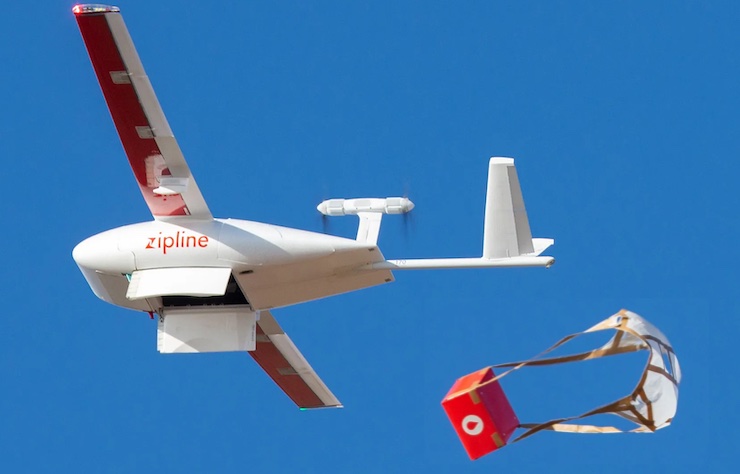
2024 promises to be a banner year for retail drone deliveries across the United States. A handful of US-based drone companies, having acquired FAA approval to conduct flights on a Beyond Visual Line of Sight (BVLOS) basis, are poised to begin making long-distance deliveries at scale without the need for ground observers or special safety checks. Of these companies, South San Francisco-based Zipline, founded over a decade ago, and boasting some $500 million in total investment, has emerged as the first among equals.
The company first cut its teeth with medical supply deliveries in Rwanda back in 2016, a role that allowed the company to build up a sterling performance and safety track record on a continent with few regulatory controls. Zipline soon expanded into Ghana and Nigeria, and then returned stateside to begin medical deliveries for hospitals and clinics in North Carolina and Utah (and more recently Ohio) and retail store deliveries for Walmart in Texas Its latest venture is a series of smaller partnerships with quick-service food chains, including Jet’s Pizza in Detroit and Panera Bread in Seattle. Zipline just passed the 1 million mark in small package deliveries worldwide, having clocked some 70 million flight miles overall since its founding in 2014.
But it’s not just the volume of deliveries – and growing market share, tops among US suppliers– that marks Zipline as a true pioneer. The company has also demonstrated an extraordinary capacity for innovation and adaptation to diverse delivery settings and markets. Its original fixed wing drones dropped medical supplies in Africa using a timed parachute drop system that allowed its aircraft to speed across landing zones at full speed without having to hover over buildings and gently lower packages to the ground on a cable, which consumed precious time and battery power. But as the company has transitioned into food and retail delivery, it has introduced quadcopters that can linger on station, allowing more delicate precision drops to residential backyards, as needed.
While other drone delivery companies including Wing, Drone-Up, Flytrex and UPS Flight Forward are design and technology innovators in their own right – and have also recorded significant increases in deliveries of late – Zipline’s growth trajectory is exceptional. The company estimates that 70% of all of its deliveries have occurred in the past two years alone. And with a major expansion planned with Walmart in Texas (covering the entire Dallas-Fort Worth area) and other food delivery and medical supply partnerships soon to be unveiled, the company hopes to expand its global service volume to a whopping one million flight deliveries daily by the end of 2025.
“The three areas where the incentive really makes the most sense today are health care, quick commerce and food, and those are the three main markets that we focus on,” Ziple CEO Rinaudo Cliffton told CNBC last week. “Our goal is to work with really the best brands or the best institutions in each of those markets.”
Zipline hasn’t yet begun deliveries for Panera Bread in Seattle, but is expected to early next year. Zipline’s latest store partnership is with Mendocino Farms, which provides ready-to-eat food to customers in Northern and Southern California. Meanwhile, the company has also returned to its original service focus through a major new partnership with Cleveland Health Clinic, the leading primary care center in rural Ohio. Zipline will be testing its new Platform 2 autonomous delivery system which allows for aerial shipment to end users within a 10-mile radius of the initial launch site. Platform 2 features the use of Zipline’s noiseless and precision-guided “droids” – encased containers that protect the cargo but also adjust for wind and rain to allow for pinpoint placement of cargo in confined spaces, including backyards, porches and patios. While Zipline has experimented with Platform 2 for its food sector clients – including most recently, Sweetgreen – this will be its first real-world test of the new technology in the medical supply niche.
|